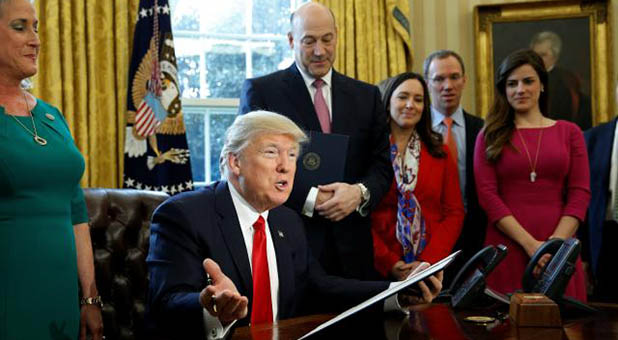During Wednesday’s daily White House press briefing, President Donald Trump’s legislative affairs director, Marc Short, gave an overview of the impact the Congressional Review Act has had, so far, in rolling back Obama Administration regulations.
To date, the economic impact by these deregulation efforts is expected to be about $10 billion over the next 20 years, with more joint resolutions expected to be approved before Congress goes on recess this month. However, the full impact of the Obama administration’s regulations is expected to be $740 billion.
Here’s what Short had to say:
We wanted to take a few minutes to talk about what the administration has been focused on in terms of regulatory burden. And that’s best, I think, embodied to the Congressional Review Act and legislation. And I don’t think Americans really understand what is the Congressional Review Act. And so I want to sort of frame this in the larger context of the regulatory burden that this administration inherited and what we’re trying to do with that.
I think the president is keeping his promise to Americans to roll back that regulatory burden. And as a result, I believe that we are helping to spur growth in the American economy. We inherited—this administration did—the biggest regulatory burden, we believe, of any president in American history. And after an onslaught of new regulations that we believe were slow on the economy and hardworking Americans, this administration has gone to work at how to pull that back.
The previous administration authored more than 600 major regulations according to the Federal Register, with an estimated cost to the economy of about $740 billion. President Trump, on the campaign, promised several things on this front. He promised to freeze regulations and to “issue a temporary moratorium on new agency regulations.” And he did that. He promised that for every one new regulation, two old regulations must be eliminated. That promise has been kept. He promised to lift the restrictions on American energy, and he’s done that. He promised to ask each and every federal agency to prepare a list of all the regulations that they impose on the Americans, which are not necessary—and he’s done that. He promised to cut regulations massively, as he said, and he has. And I’m asking you to look at what the Congressional Review Act does.
The Congressional Review Act was signed into law in 1996. And what many of you may know is it allows a limited window for us to actually pull back previous regulations. So it allows Congress, the House and the Senate, to look at those regulations and to eliminate those, that they pass by a simple majority.
When you change administrations, it allows you an additional 60-day legislative calendar window to look back. So there’s a 60-day backward window and also, in the new administration, an additional 60 days on the legislative calendar. What all that means I think for—what you guys need to know is that window is closing at the end of April. Previously, there had been one time in history—President Bush in 2001 used the Congressional Review Act to sign into law legislation to pull back those regulations. This administration has already signed 11, and there are two more pending for us to sign.
We believe this is having a dramatic impact in pulling back the regulatory burden, as I said, and that we believe that, so far, that cost or that benefit to the economy is over $10 billion in regulations through the Congressional Review Act that are being saved by the American taxpayer so far.
In addition, as you know, we’re using executive action to stop some of the costs of these regulations. He signed more than a dozen executive orders that, among other things, require us to review the cost of the Clean Power Plan, review EPA’s Waters to the U.S. regulation, clear regulatory burdens to small businesses, lift the moratorium on onshore coal leasing, begin a plan to reorganize or eliminate wasteful government agencies and to give the HHS Secretary the discretion to provide states with the flexibility under Obamacare. These are all efforts to, again, in different areas, pull back on the regulatory front.
Some of the CRAs are not specific to jobs, but many of them are. We believe that major companies like Ford, Fiat-Chrysler, General Motors, Sprint, Softbank, Exxon, Lockheed and even Carrier, have mentioned to the president and the vice president different times that one of the reasons they’re recommitting to job growth in the United States and keeping jobs here is because of the commitment to sign these pieces of legislation, to pull back on the regulations that they’ve been facing, and as well the commitments to tax reform.
So those are efforts that we believe are helping to create jobs. But we’re asking you today to consider—I know there’s a lot of big stories—tax reform, health care, a lot of things you’re covering—is that this window on the CRA closes. And we do think that, again, that Bush having signed one, this administration already signed 11 into law, it is a tool that we’re taking advantage of and that we’re actually passing this legislation, and that working with House and Senate leadership, there are several more that we hope to sign before this window closes on April 28th.
And we believe it’s actually having a dramatic impact for the American taxpayer. Do we have those?
So we also have to give you a quick handout. And this I think summarizes what those 11 are, what the two are that are pending, and then additionally a couple that have passed the House. They’re waiting for action in the Senate that we hope to receive to sign into law before the end of April, as well.
So a quick overview on what the CRA does, which ones are pending. {eoa}
See an error in this article?
To contact us or to submit an article





















